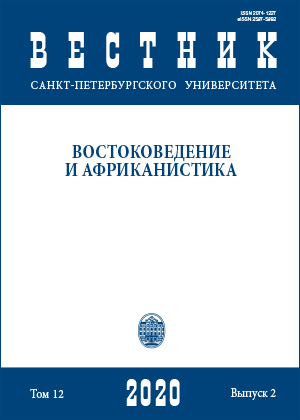Representation of Myth in Traditional Indian Culture
DOI:
https://doi.org/10.21638/spbu13.2020.207Abstract
The myth is perceived in modern Western culture as a relic of the distant past, in contrast to this, in Indian traditional culture the myth has not been supplanted by science, philosophy and other ways of knowing the world; he retains his vitality and actively exists in modern life. In this article, the term “myth” does not mean the illusory reflection of reality for building a fantastic picture of the world, but as a special way of perceiving and understanding life. Its particular manifestation is a verbal text with a statement of value-world outlook truths. The myth existed at the origins of Indian traditional culture as a solid foundation and served as the main way to organize its main material. It is in myths that the most important knowledge, standards and attitudes were recorded and stored. A number of examples analyze the reflection of myth in Hinduism, in temporal representations and in festive ritual practices deeply rooted in the traditional culture of India. Hinduism, unlike the dogmatic Abrahamic religions of scripture, is a mythological religion. For centuries, it existed in line with mythology, which provided ready-made matrices for religious, theological, philosophical and other ideas. On the basis of myths, a repertoire of basic symbols, ideas and concepts of this religion was formed. The temporal representations of traditional Indian culture also go back to mythological sources. The cyclic model of mythological time was reflected, in particular, in Indian calendar-chronological systems. Myths constantly serve as the basis and explanation of many holidays in the traditional calendar ritual. The above examples convince that the whole history of the existence of traditional Indian culture is permeated by mythology, which functions as a kind of information-modeling system, permeating almost all spheres of human life.
Keywords:
India, traditional culture, myth, Hinduism, temporal representations, rituals, holidays.
Downloads
References
Downloads
Published
How to Cite
Issue
Section
License
Articles of "Vestnik of Saint Petersburg University. Asian and African Studies" are open access distributed under the terms of the License Agreement with Saint Petersburg State University, which permits to the authors unrestricted distribution and self-archiving free of charge.





